Posted November 12, 2007
— by Farooq Tariq
[Update 11/30/2007: A leader of the All Pakistan Trade Union Federation has been released].
[Update 11/15/2007: Read Solidarity’s statement on the State of Emergency!].
General Musharraf would not have imagined the political scenario that has emerged after five days of the martial law he imposed on 3rd November. His hopes for “normalizing” the situation have been dashed, even after he has used the most vicious repression against the lawyers and political activists.
More unpleasant surprises are in store for the military regime, which was accustomed to a rather stable political control until now.
After the lawyers, now students are emerging in political opposition to the military regime. Demonstrations took place on 7th November in most of the public and private universities, mainly in the major cities of Pakistan. “Student power rises from slumber” was the headline of News International on 8th November.
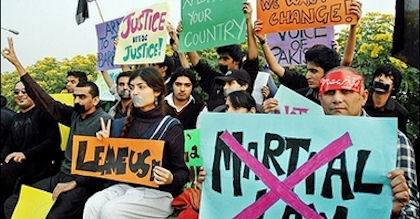
Pakistani students rally against martial law.
All the courts across Pakistan are at a standstill, and the Pakistan Bar Council has announced an indefinite strike till the new Provisional Constitutional Order (PCO) is withdrawn. There have been daily demonstrations by the lawyerss across Pakistan. This is an extraordinary show of militancy by the middle classes during this period.
Most of the newspapers in Pakistan are full of stories of the arrests, demonstrations and strikes by different sectors of society. But it is the fifth day; no private television channel has been allowed to broadcast in Pakistan. You can only watch songs, dances, sports and religious readings on different channels, but no news bulletin is allowed apart from the official Pakistan Television.
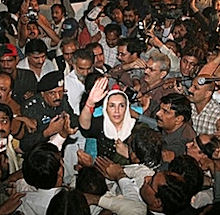
The most surprising opposition to the military regime has come from Benazir Bhutto. She had been in negotiation with Musharraf regime for a power sharing formula. But the lawyers’ movements intervened in this unholy alliance, forcing Benazir Bhutto to come up openly against the military regime.
Almost half of the arrested lawyers belong to Bhutto’s Pakistan Peoples party. It left very little room for Benazir’s maneuvering and playing games with the regime.
She asked the Pakistani masses to rise up against the martial law of general Musharraf. “Restore the constitution or we will have long march from Lahore to Islamabad on 13th November,” she warned the regime.
This resulted in the arrests of Pakistan Peoples Party activists across the country. They had been spared by the regime in the first phase of repression that started from 3rd November.
The media organizations of the bosses and employees are also joining the mass movement, after unprecedented repression against the electronic and print media by the regime.
It was a black Monday on 5th November for the stock exchanges in Pakistan. The stock exchange crash resulted in a net loss of four billion dollars in one day, unprecedented in the 17-year history of the exchange.
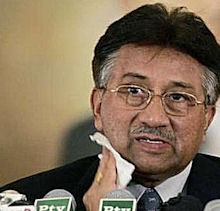
For the first time since 9/11, Musharraf’s close imperialist friends from the United States, Britain and the European Union have been forced, at least verbally, to condemn this imposition of emergency. For U.S. imperialism, any gross violation of human rights in Pakistan since 9/11 had been always an “internal matter.”
Even Australian imperialism is also condemning the sorry state of affair of Pakistan and terming Musharraf “a dictator” for the first time — a fact Pakistani people knew for eight years.
But it seems General Musharraf is trying to show his angry face even to his bosses, in the same way that religious fundamentalists in Pakistan are getting out of control of the military regime. “You can never control a monster for a long time,” it seems from the action of General Musharraf.
Netherlands has suspended aid to Pakistan, and the United States is reviewing its relationship with the military regime, according to the reports printed here.
The movement is still growing in all spheres of life, despite an unprecedented level of repression during the first five days of the emergency, whose real name is martial law.
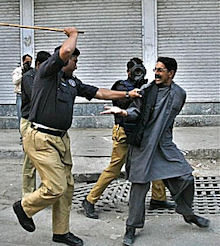
The police entered the office of Human Rights Commission of Pakistan, arresting more than 80 social and political activists who were discussing their strategy to oppose the military action. It was previously unheard of for police to enter this most prestigious independent building in Lahore.
Police went into the Lahore High Court buildings and arrested over 700 lawyers from the chambers of the judges, libraries, legal rooms and canteen — which was not done even under the most brutal martial law of General Zia Ul Haque in the eighties.
According to the home ministry in Punjab province, 1734 political activists, journalists and lawyers have been arrested during the first four days of martial law. Similar figures are stated by the administrations of the other three provinces. This is the most brutal repression of the opponents of the Musharraf regime during the last eight years.
The arrested lawyers and activists have been charged under the Anti- Terrorist Act and sent to places far from their home towns. No one can meet them.
Similar repressive treatment has been brought against those judges of the Supreme Court and High Courts of Pakistan who have courageously refused to take oath under the new Provisional Constitutional Order (PCO). They are put under house arrest and their children are not allowed to go to school. Doctors have been refused entries to their houses where they were called for emergency treatments.
Police are raiding the houses of the lawyerss and political opponents of the military regime on regular basis. Pakistan has become a police and military state in the real sense of the term.
Police are seen everywhere in the main cities. Yet there has been an increase of thefts and robberies during the last four days as police are only deployed to curb the opposition to the regime.
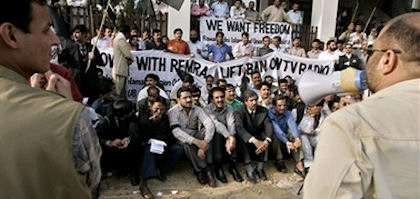
Journalists hold a protest camp against crackdown and censorship.
General Musharraf is now facing more opposition than ever among the general public in Pakistan. He is losing his internal and external support at rapid speed. He has almost lost the support of his most recent friend, Benazir Bhutto.
The religious parties have been forced to de-link their long lasting relationship with the regime. The old alliances and formations are in crisis. This is a real crisis of the Pakistani state.
Now only two political parties are supporting the regime, the Muslim League and Muhajir Qaumi Moveemnt. Both are partners of the military government, but both are hated more and more by ordinary citizens of Pakistan.
The option of repression to control the opposition is losing its strength day by day. The state can not repress all growing voices against the regime.
The implementation of the neoliberal agenda at a faster speed has been marked by daily price hikes and growing unemployment. The growth of the capitalist economy has not touched to the bottom level – over 70 percent of the total population of 160 million.
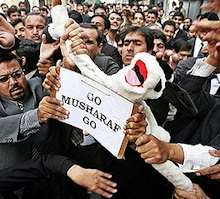
Several activists of Awami Jamhoori Tehreek (AJT), the left alliance of seven political parties and groups, are under arrest including Nisar Shah,the chairperson of the Labour Party Pakistan.
Abid Hassan Minto, the convener of AJT and president of the National Workers Party, has asked all the left forces to join the movement and fight the military regime. The Left is no longer an insignificant force in Pakistan. The student uprising against the regime is mainly the work of the left wing forces and radical social activists.
The regime cannot last long. The movement is on and is growing. The lawyers’ unprecedented courage has influenced many to take the road of active opposition.
The opposition to military regime will be strengthening by the active solidarity of our friends and comrades outside Pakistan. Pickets at the Pakistan embassies all over the world will be one the most effective way of opposition. We are not alone, we know — but we need to know more of it.
More Information:
- Previous SOLIDARITY front page on Pakistan, with essay by Tariq Ali
- Massive Rally in Kasur, led by Pakistani Trade Union Defense Committee, calls for 24 hour general strike
- A View from the Pakistani Left: MRZine review with Farooq Tariq
- Labour Party of Pakistan – Solidarity’s sister organization in Pakistan, of which Farooq Tariq is secretary
- The Emergency Times, an independent student-run blog on the situation in Pakistan
- Mother Jones Magazine interview with former US government official provides some inside information on dynamics within the Pakistani military
- Articles On Pakistan from Europe Solidaire Sans Frontières
- Pakistan Solidarity Appeal – No to the State of Emergency! No to Martial Law!
- International Viewpoint, magazine of the Fourth International
- Rule of Force vs. Rule of Law in Pakistan from Foreign Policy in Focus
- News Articles on Pakistan from Google News
